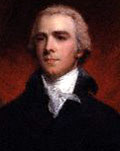William Grenville was the third son of the former prime minister George Grenville and cousin of William Pitt the Younger. Educated at Eton and Oxford (Christ Church College), he entered Parliament in 1782 (MP, 1782-1790) and joined the Rockingham-Fox opposition. In 1783 he became a member of the Pitt Administration and was elected the youngest Speaker of the House of Commons (5 Jan 1789 - 5 Jun 1789) since the time of Edward III. In 1790 Grenville was created Baron Grenville of Wotton-under-Bernewood and took his seat in the House of Lords. After holding a number of ministerial offices in 1791 Grenville, at the age of thirty-one, became Pitt's Foreign Secretary (1791-1801) for a decade. After Pitt's death in office the King lacking candidates turned unenthusiastically to Grenville to be his next prime minister. With similar lack of enthusiasm Grenville accepted the office of First Lord of the Treasury (11 Feb 1806) and formed a broadly based Administration from three of the four major factions, with Charles Fox as his Foreign Secretary - a 'Ministry of All the Talents'. He instituted reforms in the Treasury's accounting practices, reorganized the armed forces, and reformed the governing of Scotland to ensure support of Scottish MPs. With Fox he successfully moved a resolution in the House of Commons abolishing the slave trade. This vigorous start was not maintained. Fox died (13 Sep 1806) and Grenville lost Pittite support, although he increased his majority at the General Election of 1806. When his administration sought to extend military commissions to Catholics, he clashed with the King to whom he refused reassurances not to raise the subject again. He resigned (25 Mar 1807) barely a year after taking office, but remained politically active for another fifteen years. He was a nominal leader of the Opposition from 1807 to 1817. [1, pp. 90-97] |

